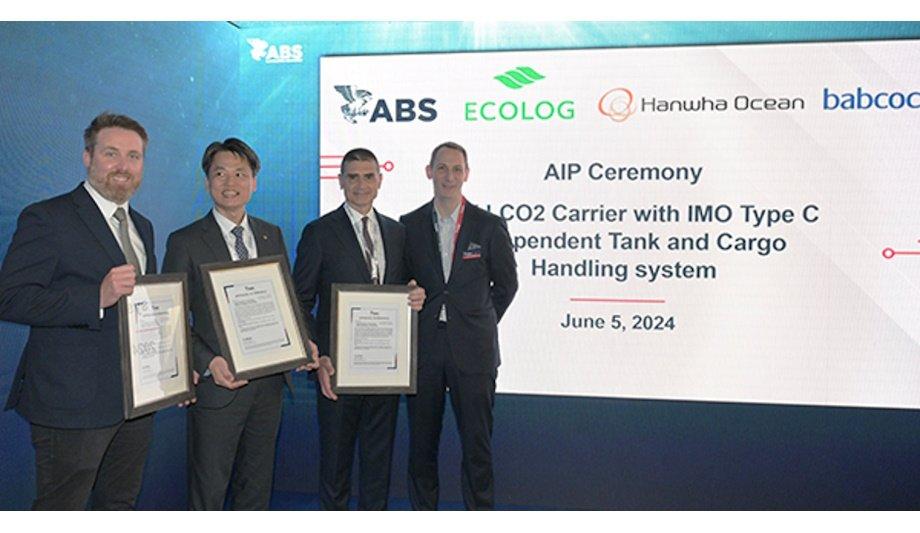ABS issued an approval in principle (AIP) for a low-pressure, shallow-draft, low carbon footprint 40,000 cbm liquid carbon dioxide (LCO2) carrier design for ECOLOG Services Ltd. (ECOLOG).
This AIP is the result of extensive cooperation within a joint industry project on the detailed design development, taking into account LCO2 critical characteristics, including operational requirements with respect to low pressure and shallow draft. The design maximises energy integration and minimises greenhouse gas emissions.
Hull and cargo tank design
ABS completed design reviews following the requirements in ABS Marine Vessel Rules
The project team included Hanwha Ocean Co., Ltd. who developed the hull and cargo tank design, as well as Babcock LGE who contributed their expertise on cargo handling systems and integration.
ABS completed design reviews in accordance with the requirements in ABS Marine Vessel Rules and the ABS Guide for Liquefied Gas Carriers with Independent Tanks.
Safe transportation of CO2
"ABS is proud to use our expertise as the world’s renowned classification society for gas carriers to support ECOLOG, Hanwha and Babcock LGE with this new design that supports the global energy transition. The safe transportation of CO2 plays a vital role in the carbon value chain, and we are ready to support such projects with guidance to minimise risks to the crew, vessel and the environment," said Panos Koutsourakis, ABS Vice President, Global Sustainability.
He adds, "ECOLOG, as a mid-stream CO2 services company, is dedicated to net zero, supporting urgent action on climate change."
LCO2 shipping transportation
ECOLOG has contributed to this JIP with its knowledge in cryogenic gas transportation and how LCO2 shipping transportation fits in the wider Carbon Capture Utilisation and Storage (CCUS) supply chain.
ECOLOG is committed to building and owning a fleet of liquid CO2 carriers
The effect of a wide variety of CO2 compositions on the resilience and commerciality of the containment and cargo handling system versatility was a key consideration in the AIP study.
ECOLOG is committed to building and owning a fleet of liquid CO2 carriers to serve the emerging CCUS sector. ECOLOG’s strategy revolves around connecting hard-to-abate emitters with cost-competitive sequestration sites and high-value reuse facilities, utilising ECOLOG’s midstream infrastructure, including ships and terminals.
Large-scale CO2 service platform
"ECOLOG is developing the world’s first large-scale CO2 service platform in the CCUS supply chain. ECOLOG has the ambition to build a business that can liquefy, transport and store 50 million tons of CO2 annually anywhere in the world," said Dr. Panos Deligiannis, Head of Shipping, ECOLOG, www.ecolog.earth.
"This vessel that received AIP from ABS is a new type of LCO2 carrier capable of transporting large quantities of liquid CO2, which can dramatically improve operating costs. Hanwha Ocean will continue to strive for the development of ultra-large LCO2 carriers," said Seung-Han Moon, Hanwha Ocean Head of Engineering & Technology Unit.
Recent developments in CO2 shipping
Michael Scott, Sales Director, Babcock LGE, said "Participation in this exciting joint industry project further builds on recent developments in CO2 shipping for Babcock LGE’s ecoCO2® technology. Working with ECOLOG, Hanwha Ocean and ABS ensured that our ecoCO2® solution was optimised for CCUS value chain parameters including shipping profiles, loading and discharge terminal parameters, cargo composition and cargo volumes."
He adds, "Award of this AiP marks a crucial decarbonisation milestone at a time when collaboration on new ship designs matters more now than ever."














